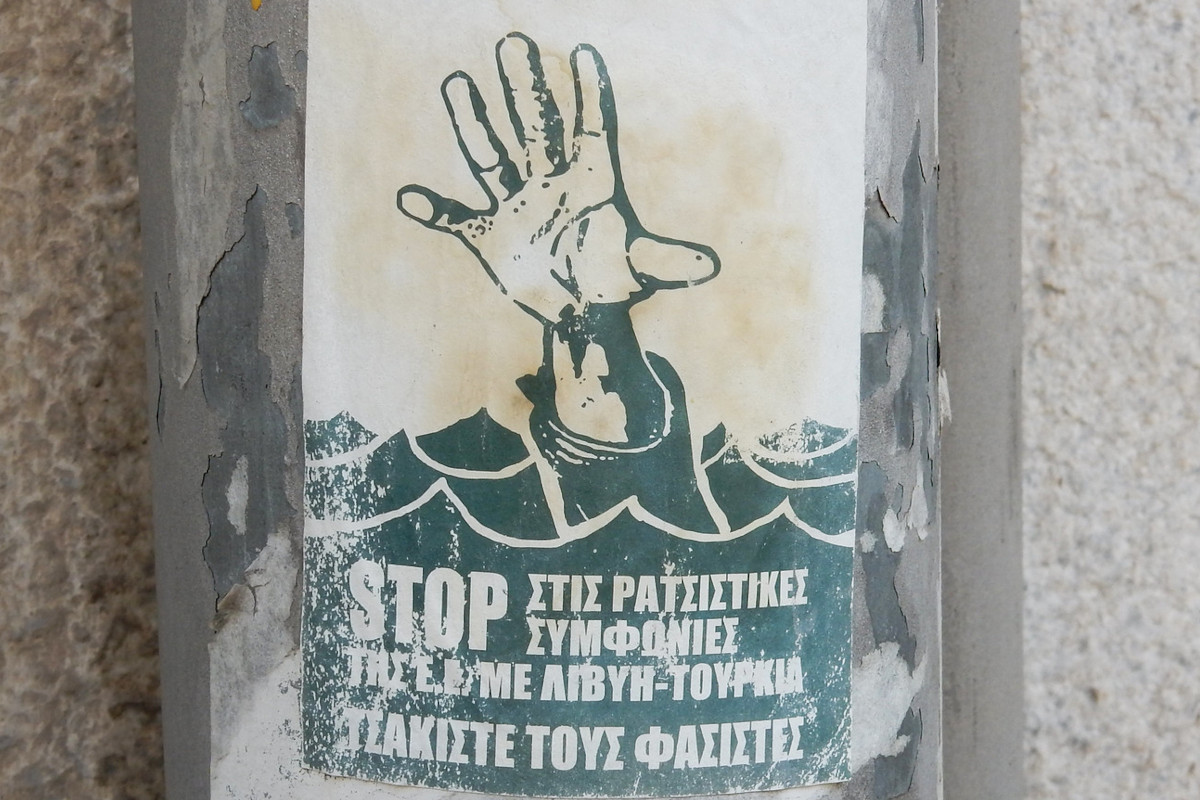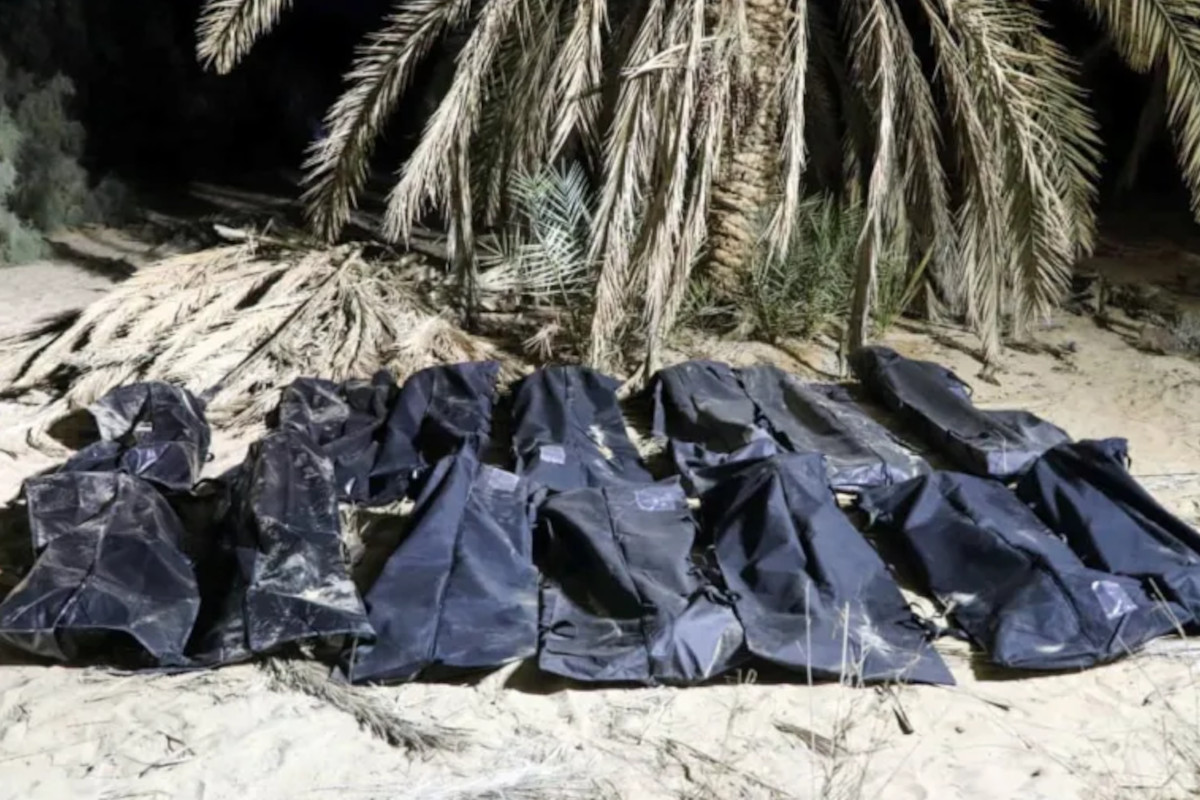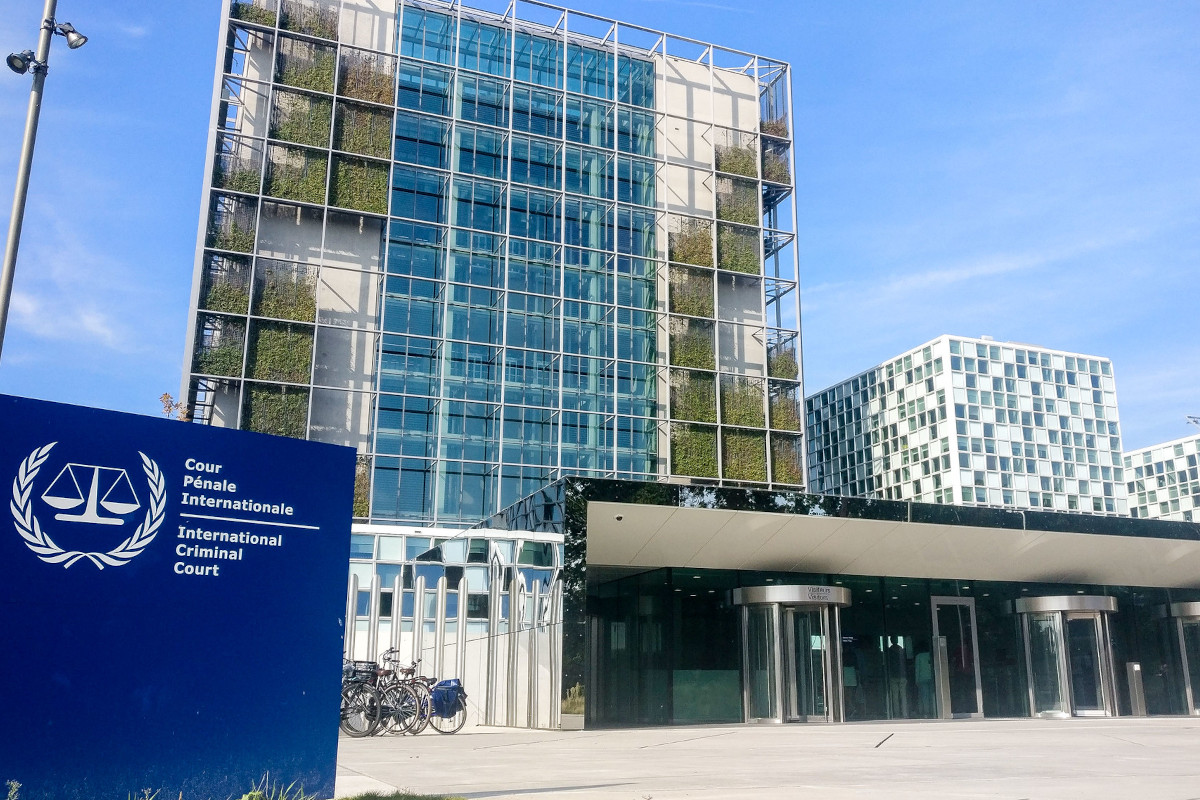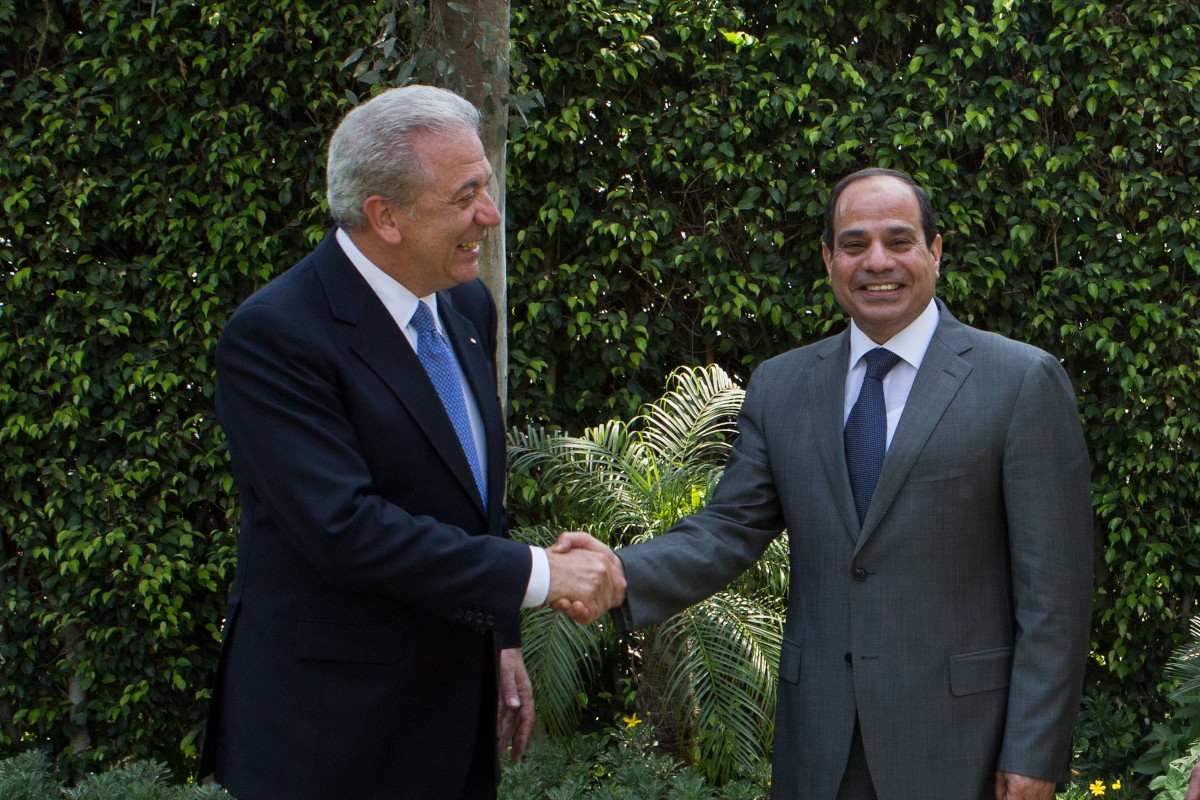Impunity for war criminals and the European migration strategy in Libya
Topic
Country/Region
02 April 2025
New leaked documents show that the EU’s “border assistance mission” in Libya is slowly expanding its work and is entering a “consolidation phase”. The efforts to “stabilise” the North African country include increased cooperation with Frontex. Meanwhile, in January, a wanted war criminal was arrested in Italy, only to be released and flown back to Libya on a government jet. This act made Italy and the EU’s reliance on third-state actors to maintain their migration policy clear. Politicians in Europe consider their migration policies so essential that they are willing to undermine the so-called rules-based international order to maintain them.
Support our work: become a Friend of Statewatch from as little as £1/€1 per month.

A poster in Athens, Greece: "Stop the racist agreements between the EU and Libya-Turkey / Fight the fascists". Image: Julia Tulke, CC BY-NC-SA 2.0
Summary
- The EU Border Assistance Mission in Libya (EUBAM Libya) has been in place since May 2013
- It works to increase the ability of “the relevant Libyan authorities" to deal with "cross-border crime, including human trafficking and migrant smuggling," and terrorism
- Leaked documents show that the EU perceives a renewed "appetite" from the Libyan side for cooperation
- Whilst the mission's new operational plan was being renewed, the Italian government was helping a wanted criminal, Al Masri, escape justice
- They flew him back to Libya, where he has allegedly committed murder, torture and rape whilst helping to "contain" migration across the Mediterranean - a clear sign of Italy, and the EU's, dependence on local "strongmen" for enforcing their migration policy
- The impunity of individuals such as Al Masri is a testament to the legal and moral bankruptcy of the EU’s approach to migration
Leaked strategic assessment
Since May 2013, the EU Border Assistance Mission in Libya (EUBAM Libya) has worked to improve the ability of “the relevant Libyan authorities and agencies to manage Libya’s borders, fight cross-border crime, including human trafficking and migrant smuggling, and counter terrorism.”
Its specific remit has changed over time. The most recent update, approved in June 2023 introduced specific references to cross-border crime, migrant smuggling and human trafficking, and terrorism. The mission plays an important role in extending the EU’s externalisation and containment approach to migration on the African content.
Last year, EUBAM Libya produced an interim strategic assessment of its work (pdf). The report was circulated to EU and national officials in July. It highlights the supposed success of the mission’s security collaborations and information exchanges with Libyan authorities.
According to the report, the Libyan Ministry of Interior of the Government of National Unity (GNU) has a renewed “appetite” for cooperation with the EU and its missions on security matters. This is particularly so in relation to criminal investigations and counter terrorism.
The report alludes to the unstable political situation in the Sahel as a motivation for this cooperation. It notes that the EU must keep fostering the Libyans’ “sense of ownership” in these matters.
The leaked report generally signals that, at the time of writing, the mission was entering a “consolidation” phase. It expresses that EU support to Libyan authorities on border management is advancing in “positive” ways.
Leaked operational plan
However, a more recent document seen by Statewatch highlights the challenging security context in which the mission operates. This includes a lack of state authority in the south of Libya. The document, a revised operational plan for EUBAM Libya, was sent from the European External Action Service to the Council’s Political and Security Committee for discussion in mid-January.
Both documents allude to problems for EU staff because of difficulties in getting visas delivered to them. This makes it challenging for EU staff based in Libya to hire European security personnel, for instance.
EUBAM’s efforts to increase the Libyan authorities’ control over the country’s borders by empowering its security institutions will have obvious negative effects. It will clearly be to the detriment of the thousands of people who hope to make the dangerous crossing of the Mediterranean.
The operational plan also refers to ongoing efforts to enhance cooperation with EU justice and home affairs agencies, notably Frontex. Frontex’ role in facilitating pullbacks to Libya through aerial surveillance has been documented by Human Rights Watch and others.
The EU is very much aware of the criticism around their approach to migration in the Central Mediterranean, stating in the operational plan that:
“The support provided to the Libyan border authorities by the European Union and its member states continues to be under heavy scrutiny and allegations of EU complicity in the practice of refoulement have been repeatedly made by numerous international human rights groups, activists and politicians.”
Integrated border management in Libya
The EU set up EUBAM Libya in 2013 in the framework of the EU’s Common Security and Defence Policy (CSDP). It has been a central vehicle for trying to export the EU’s model of “integrated border management” to the North African country. In June 2023, EUBAM’s mandate was renewed until the end of June this year.
As part of the mission, in October 2023, a memorandum of understanding was signed between EUBAM Libya and Libyan officials. This had the stated aim of:
“…strengthening the cooperation and coordination between EUBAM Mission and Libyan institutions in managing and securing Libyan borders and in fighting against border crimes and terrorism”.
Around the same time, the mission was discussed in the EU’s Working Party on the External Aspects of Migration. A note from the Hungarian Presidency of the Council of the EU suggested that in the future there would be “embedment of EUBAM experts on a regular basis in Libyan agencies, such as the Libyan Coast Guard.”
EUBAM Libya’s current head of mission, Jan Vyčítal, was at the meeting to give a presentation (pdf). This said that to fulfil its mandate of supporting border management and countering crime and terrorism, the mission has a “three-pillars approach.”
According to the presentation, the mission does this through:
- Infrastructure and equipment
- Modernize checkpoints
- Provide essential equipment
- Support infrastructure development
- Capacity Building
- Training programs
- Knowledge exchange
- Leverage EU/Member States expertise, including deploying specialized teams and visiting experts
- Enhance capability
- Enhance investigative skills
- Improve detection techniques
- Facilitate information sharing
- Support regional initiatives
Integrated border management
Integrated border management (IBM) is a concept that was first introduced by the European Commission in 2002.
It is the central plank of the EU’s system of border control and migration management, and is based on “the four-tier access control model.” This is made up of:
“…measures in third countries, such as under the common visa policy, measures with neighbouring third countries, border control measures at the external borders, risk analysis and measures within the Schengen area and return.”
Amongst the “measures in third countries” is the export of the IBM model itself. It is an integral aspect of the EU’s strategy of externalising border control and can include:
- the posting of European liaison officers to non-EU states to enable information-gathering and exchange;
- the signing of readmission agreements, to facilitate deportations; and
- the transfer of knowledge and border management techniques through the training of officials from third states.
Several EU policies and instruments have contributed to training and strengthening Libya’s security apparatus. These have often come under the guise of technical assistance for Integrated Border Management (IBM).
Funding sources have included the EU Emergency Trust Fund for Africa, a multi-billion euro fund that was set up in 2015 to address the “root causes” of migration on the African continent. The North of Africa “funding window” supported multiple projects involving the security authorities of countries such as Tunisia, Morocco and most controversially, Libya.
The EU’s support to integrated border management projects has also been integral to the bolstering of the so-called Libyan coast guard. Two phases of funding provided technical assistance and training that meant the entity could operate in the Libyan maritime search and rescue region, which was officially declared in 2018.[1]
Italy was responsible for transferring those funds and has played a central role in supporting the Libyan coast guard. The country’s approach to migration across the Central Mediterranean has been consistent since 2017, when the Italy-Libya memorandum of understanding on migration was agreed. The memorandum was renewed in 2020.
Call for the EU to support international justice
Some weeks after EUBAM’s new operational plan was discussed by officials in the EU’s Political and Security Committee, Giorgia Meloni’s government was busy helping the head of Libya’s judicial police, Osama Almasri Najim, travel from Italy to Libya.
Al Masri is wanted by the International Criminal Court (ICC) for war crimes and crimes against humanity including murder, torture and rape, dating back to 2015. He was arrested in Turin on 19 January whilst attending a football match, but was then flown back to Tripoli on an Italian government plane. Upon arrival, he was greeted by an exuberant group of men, chanting and visibly overjoyed at his return.
Three weeks later, on 11 February 2025, David Yambio was in the European Parliament to speak at a press conference. Yambio is the founder of Refugees in Libya, an organisation that supports refugees, asylum-seekers and migrants in Libya “who are being subjected to violence and made vulnerable through innumerable means.”
Yambio expressed his crushing disappointment at the Italian government’s decision to ignore the international arrest warrant for the man who allegedly tortured him in a Libyan jail. He called on the EU to support the activities and mandate of the ICC.
Al Masri, a wanted war criminal
Yambio is not the only critic of the support given to Al Masri by Giorgia Meloni’s government. The international lawyer Omer Shatz condemned Italy’s actions and highlighted that they could be read as a silent avowal of collusion with Al Masri.
Shatz argues that Italy’s decision to ignore the ICC warrant demonstrates, once again, the country’s complicity in the crimes against migrants committed by Libyan authorities and militias. Those crimes have been facilitated by the EU’s approach to migration in the Central Mediterranean.
There are also broader ramifications of the Italian government’s decision. It came at a time when the ICC already faces unprecedented challenges to its legitimacy. A number of European states have remained non-committal or have actively criticised the ICC’s arrest warrants for the Israeli politicians Benjamin Netanyahu and Yoav Gallant, for war crimes committed in Gaza. A recent executive order signed by Donald Trump imposes sanctions on the court’s employees and agents.
Barring migrants at any cost
Meloni’s apparent personal decision to ignore the ICC arrest warrant and help Al Masri escape to Libya is a sign of the dependence of Italy (and by extension the EU) on local security strongmen to affect migration control on the EU’s behalf.
The EU appears not to have directly condemned the Italian government’s non-compliance with the ICC’s arrest warrant. A spokesperson “reaffirmed all EU member states had pledged to cooperate with the court,” according to euronews, despite research that suggests the contrary, at least regarding the arrest warrants for Netanyahu and Gallant.
The impunity of individuals such as Al Masri is a testament to the legal and moral bankruptcy of the EU’s approach to migration. The EU’s long-standing goal is to bar migrants from reaching European territory, at any cost. This goal seems to have no limits, even if this involves eroding the already frail authority of the ICC, as the (so-called) rules-based liberal order staggers under rising right-wing authoritarianism.
Author: Kiri Santer
Documentation
- Interim Strategic Assessment (ISA) EUBAM Libya 2024 (Council doc. 12008/24, LIMITE, 5 July 2024, pdf)
- Presentation on EUBAM Libya (Council doc. WK 13216/2024 INIT, LIMITE, 21 October 2024, pdf)
Note
[1] The Libyan SRR was communicated to the International Maritime Organisation in 2018.
Our work is only possible with your support.
Become a Friend of Statewatch from as little as £1/€1 per month.
Further reading

Libya: After discovery of mass graves, EU funding should "save lives and open up safe routes"
More than 30 organisations, including Statewatch, have called on the European Commission to use its funding for immigration control in Libya "to save lives and to provide alternatives to dangerous journeys." The call comes after the discovery of two mass graves in Libya, containing the bodies of almost 50 people believed to have been migrants and refugees.

Italian ministers should face justice for freeing fugitive war criminal, says legal complaint
A case filed with the International Criminal Court calls for the launching of investigations into Giorgia Meloni, the Italian prime minister, and two other high-ranking Italian politicians. The complaint accuses them of helping an alleged war criminal wanted by the ICC to escape from Italy to Libya. In doing so, they obstructed the work of the International Criminal Court, says the filing - a crime under international law.

Frontex collaboration with Libya: “we call them and try to persuade them to take them back”
The EU Border and Coast Guard Agency, Frontex, has been accused of aiding the return of migrants who have fled Libya back to the country, and to possible torture and blackmail. Border guards who have worked for Frontex, speaking to journalists from the Swedish television programme Mission Investigate, by Sveriges Television (SVT), revealed just how close contact with groups in the country is. Meanwhile, a rescue mission in the Mediterranean being documented by Mission Investigate was fired upon by the so-called Libyan coast guard.
Spotted an error? If you've spotted a problem with this page, just click once to let us know.

